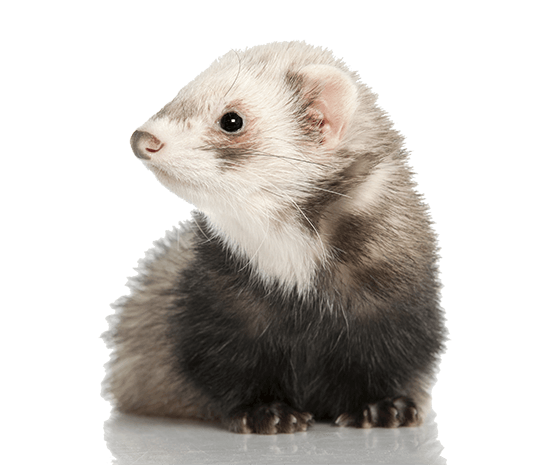How bad do ferrets stink?
The smell of a ferret can be described as being sweet and musky. Most ferret owners actually like the smell of their ferrets and don’t really find it offensive.
However, to an untrained nose, a ferret can smell quite strong. In order to reduce the smell of ferret in your household, quiet a lot of cleaning and maintenance will be required. Ferrets are at their smelliest when they come into season (especially the males—due to a build up of hormones), when they are bathed too frequently, and when their litter tray, cage and blankets are not cleaned regularly enough.
Also, the more ferrets that you keep the smellier your place will get, and therefore more cleaning will be required in order to reduce smell. Anti-Ferret Odor from Amazon

Helping Your Ferrets Live Healthier, Happier Lives
Join other ferret owners and experts and get access to Dook Dook Ferret Magazine, Ferret-World Members Community and other Resources!
Why do ferrets smell?
Ferrets can produce two types of smell. The main, everyday, musky smell comes from the oil glands in the ferrets skin (all over the body). The ferret itself should only have a subtle musky, sweet smell when you sniff it. However, the oils from the skin rub off on the ferret’s bedding and a build-up of these oils on the bedding or around the areas of the house.
Infrequent cleaning of areas in which they regularly play in, can lead to a pungent smell. That is why it is advisable to regularly clean the bedding, deep-clean the cage and have carpets cleaned on a regular basis, in order to remove excess oils from the ferret’s environment.
Unfortunately, bathing the ferret does not reduce the smell, in fact it will make it worse. Bathing the ferret actually washes the oils out of the ferret’s fur. These oils protect the ferret’s coat and skin, so when they are washed away the oil glands go into overdrive to produce more oils and therefore make the ferret smellier.
Bathing a ferret can also make their skin dry and flaky which can lead to other skin problems.
It is also important to note that unfixed ferrets will smell more then fixed ferrets. Due to the increase of hormones in unfixed ferrets, their bodies will produce more oils and their smell is much more pungent. This gets turned up to a whole other level when they come into season, especially the male ferrets, whose smell then becomes almost unbearable. Having a ferret fixed (desexed or any other alternative method that your ferret vet recommends) will help solve about 90% of the odor problem. Most ferret experts and vets recommend desexing your ferret from around 5 to 7 months of age. Talk to your vet about your options.
The second type of smell that the ferret produces occasionally is the smell from the anal glands. Ferret owners call this one a ‘poof’, it’s a rare occurrence when the ferret releases this smell. They generally do it when they have been scared by something or have gotten overly excited. This smell is very strong and highly unpleasant, and if the ferret does it while you are holding it, your clothes will most likely need to be washed to get the smell out of them. In some countries where ferrets supplied to pet stores are bred by large commercial breeders, like in the U.S.A, ferrets’ anal glands are removed before being shipped to the store. However, in other places around the world, this surgery is actually classified as animal abuse because it is believed to be an unnecessary medical procedure (due to the fact that the smell from the anal glands occurs very rarely).

Can you remove a ferrets scent glands? Should you?
In the U.S.A most ferrets are supplied to pet shops from large commercial breeders. These ferrets undergo the surgery to be desexed and descented (anal glands removed) before the age of 8 weeks old (which is considered to be far too young to put a baby ferret through). So if you are looking to get a ferret in the U.S.A then you will most likely already purchase a ferret that has had both these surgeries done.
In other countries around the world, you are most likely to get a ferret either from a breeder or a ferret shelter, because large commercial breeders don’t supply ferrets to pet shops worldwide (although there are a few exceptions).
Descenting ferrets is generally looked down upon (by vets and ferret people) as it is an unnecessary surgery to put a ferret through. The general consensus among the ferret community is that if you do not like the smell of a ferret then it is best to get another, less smelly, animal as a pet.
What are some ways to reduce ferret smell?
Having your ferret fixed
One of the biggest causes of ferret smell comes from ferrets that have not been fixed (desexed/spayed/neutered). Once you get your ferret fixed at the vet you will notice a big change in the ferrets odor.
Cleaning your ferrets litter box everyday
A buildup of feces and urine in your ferrets litter box will not only contribute to how bad your place smells but will also most likely cause your ferret to do it’s business in other non-toilet designated corners of its cage. Ferrets are actually very clean animals and do not like going to the toilet in a dirty litter box. They are far more likely to use their litter tray that is cleaned on a daily basis. So make sure you clean your ferrets litter box everyday to reduce the ferrets smell and make sure your furbaby continues using its litter tray.

Wash the ferrets bedding and blankets every week
The build up of oils from the oil glands in the ferrets skin on the ferrets bedding is one of the biggest contributors to that distinct ferret smell you and your friends can smell as you walk into your house. Changing and washing the blankets on a weekly basis (make sure you use natural, chemical-free, unscented washing detergent) will make a noticable difference to the odor in your house.
Deep clean your ferrets cage once a month
Similarly to the above point, the oils from the ferrets skin glands will also stick to the cage itself, causing it to smell. Cleaning or washing the whole cage once a month will reduce this smell.
Air your house out regularly
Open the windows and let fresh air into your home on a regular basis. This will help air out stale smelly air from the house, which is beneficial for you and your ferret alike.
Keep a clean and tidy home
Ferrets are meant to get about 4 hours of active exercise everyday, this means that the oils from their oil glands in the skin will probably be getting on your floors, carpets, furniture and toys too. In order to reduce the amount of smell, get your carpets cleaned, clean the floors, wash toys and keep your house tidy in general. Just make sure to avoid harsh chemicals as ferrets are highly sensitive to them and can cause harm to their respiratory systems.
Feed your ferret a high quality diet
A poor quality diet will make your ferret smell worse and a high quality diet will make your ferret smell better. For more information on ferret diet, check out the ‘Ferret Food’ page.
Don’t bathe your ferret
When you bathe your ferret you will actually encourage the protective oils in their coat to be washed away leading to the oil glands in their skin to go into overdrive, trying to produce more oils in their skin to protect the ferrets skin and coat. The more you bathe your ferret the more oils it will produce, leading to more smell. Overbathing ferrets can also lead to dry, scaly, itchy and unhealthy skin and coat. The only time that you may ever need to bathe your ferret is when they get dirty from playing outside or if they develop blackheads (which commonly occurs on their tails which can lead to hair loss).
Is your ferret ill?
If you do all the above points and you have found that your ferret still smells or their scent has suddenly become stronger or changed in any way, then your ferret might be sick. In this case it is advisable to talk to a vet and have the ferret checked out to see if it might be suffering from any illness.


